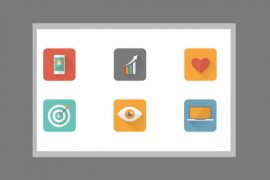Setting out on a new career path can be a very intimidating yet crucial decision. Choose the wrong path and you may invest countless hours, and thousands of dollars, chasing a career that you find out later, just isn’t for you.
This can be a tough decision for anyone, especially when faced with today’s long list of options. This has only be exacerbated by modern technology and organizations, such as Business Accelerators, which have given many young entrepreneurs the chance to pursue business ideas which were once impossible. While many may see this as a positive, and in many ways it is, it also widens our possibilities, potentially increasing the questions and unknowns when choosing which path to take.
Across the field of Psychology, many have attempted to identify what makes us tick by analyzing trends in personalities. One of the most famous methods for testing personality is Lewis Goldberg’s Big Five personality traits test, which rates individuals on a certain scale for each personality trait. These include Extroversion, Agreeableness, Conscientiousness, Neuroticism, and Openness to experience. To see where you stand on these factors, you can follow this link to find out your score.
While this topic has interested Psychologists for multiple reasons, many see personality tests like these as an excellent indicator of career choices, attributing prominent characteristics with common job responsibilities.
Openness to experience
Openness to experience has been described as the depth and complexity of an individual’s mental life and experiences. It is also sometimes called intellect or imagination. Openness to experience focusing on an individual’s willingness to try new things, to be vulnerable, and the ability to think outside the box.
Someone who is rated highly for this factor is likely to exhibit a love of learning, enjoys the arts, engages in a creative career or hobby, and likes meeting new people. As a result, those who receive a high score for this trait are more likely be suited for jobs such as social workers, fashion designer, music, teacher or something with an artistic aspect.
Conscientiousness
Conscientiousness is a trait that can best be described as the tendency to control impulses and act in socially acceptable ways. Conscientious people succeed in their ability to delay gratification, work within the rules, and plan and organize effectively. Someone that scores highly in this area is likely to be highly successful in important positions such as CEOs, Managers and Thought Leaders.
Extroversion
This factor consists of two opposing ends of the spectrum: extroversion and introversion. It focuses how an individual interacts with others and their source of energy. In general, extroverts draw energy or “recharge” from socializing with others, while introverts get exhausted from interacting with others and replenish their energy from solitude.
If you score highly on the extrovert side of the scale, you are more likely to suit a career such as Construction Worker, Event Planner or Police Officer. However, for introverts, jobs such as Graphic Designer, Software Developer or Truck Driver are likely to be more appropriate options.
Agreeableness
This factor concerns how well people get along with others. While Extroversion places a focus on an individual’s source of energy and the pursuit of interactions with others, agreeableness deals with your orientation to others. It is an idea that is based on how you generally interact with others. Those who rate highly on Agreeableness are likely to make good Customer Service Agents, HR managers, and Therapists.
Neuroticism
Neuroticism is a factor from this set which is most commonly associated with negative traits. Neuroticism is not a factor of meanness or incompetence, but one of confidence and accepting who they are. It represents one’s emotional stability and general temper. Those high in neuroticism are more susceptible to anxiety, sadness, worry, and low self-esteem. They may be temperamental or easily angered, and they tend to be self-conscious and unsure of themselves. For this reason, it is much harder to identify roles for an individual based on high scores in this trait.
This is just one of the most popular personality tests that exist which have been designed to help individuals understand the foundations of their personality, allowing them to identify their strengths and weaknesses. While some may look to these factors as guidance for a career, technology is becoming increasingly savvy, and with its binary nature, AI technology now goes one step forward and can match you with work personalized for you.
The company behind this forward thinking idea is Relink. This Danish startup aims to transform the way individuals are matched to jobs. This is done by developing and constantly training machine learning algorithms to understand what a good match between a profile and a job actually is. With the introduction of this technology, finding the perfect job for you can now be quicker and easier, cutting out the need for rigid personality tests, enabling a more personalized approach.
Deciding where you are going in life is always likely to be riddled with unanswered questions. However, thanks to technology, our options are now broader than ever, with clearer insight and a huge wealth of information at our fingertips.










